Hey! I came across two of your pages ranking for the same keywords, Trust me!
– I’m afraid you must have overlooked keyword cannibalization.
What if it has hurt the site’s overall organic performance?
So, are you looking on how to fix keyword cannibalization?
–Just relax, and read further.
Once John Mueller encountered a similar a question “what is keyword cannibalization in SEO?”
Take a look at the question that an SEO pro shot him with,
Hey, John we’ve got a feature page and the other is an informational piece about that feature. Is it okay to target the same main keyword for these two different pages?
And, John Muller’s answer will astound you for sure.
John replied, Yes, it’s perfectly fine to target keywords you want, and, from Google’s point of view, they are not going to hold you back.
Here You can find this entire conversation.
Well, getting back to the issue, does this mean it’s ok for two of your pages to compete with each other?
If NO is your answer then what would be your next step?
To come up with an exact solution stick with me throughout this blog. You’ll find out why you should fix keyword cannabilization. Above all, you should know if it is truly a great threat in the first place.
Is Keyword Cannibalization a Threat?
We have heard multiple times that you need to fixing keyword cannibalization as it affects our rankings and our whole website’s performance
Moreover, many SEO experts, influencers, and others have always warned us to avoid falling into this trap. And, as a result of it we all started with optimizing each page for a unique keyword,
Eventually, each of us ended up being too picky about adding unique title tags and meta descriptions for our pages.
However, a lot changed. Google keeps rolling out algorithms and core updates.
At last, this evolution of the search engine has prevented keyword Cannibalization from being observed as an iron-clad requirement for Google anymore.
For now, there is not much need to blindly look for ways to eliminate keyword cannibalization.
This is due to the fact that cannibalization in SEO differs with the perception of the SEO world.
Undeniably, these days SEO keyword cannibalization is a mere difficulty that occurs with helping and indicating Google to rank a specific page.
However, this doesn’t mean Keyword Cannibalization doesn’t exist. It does exist and Cannibalization is still bad as it would dilute your rankings.
Yet, it needn’t be feared as a threat anymore. To get a clear understanding on why should you fix keyword cannibalization let’s look at these examples.
A Real-time Example:
In case if you don’t know how to check for keyword cannibalization, the below pictures shows what is keyword cannibalization in Google search results.
In the image below, you can observe real keyword cannibalization of two similar pages from the same domain, with the same title tags and similar topics discussed.
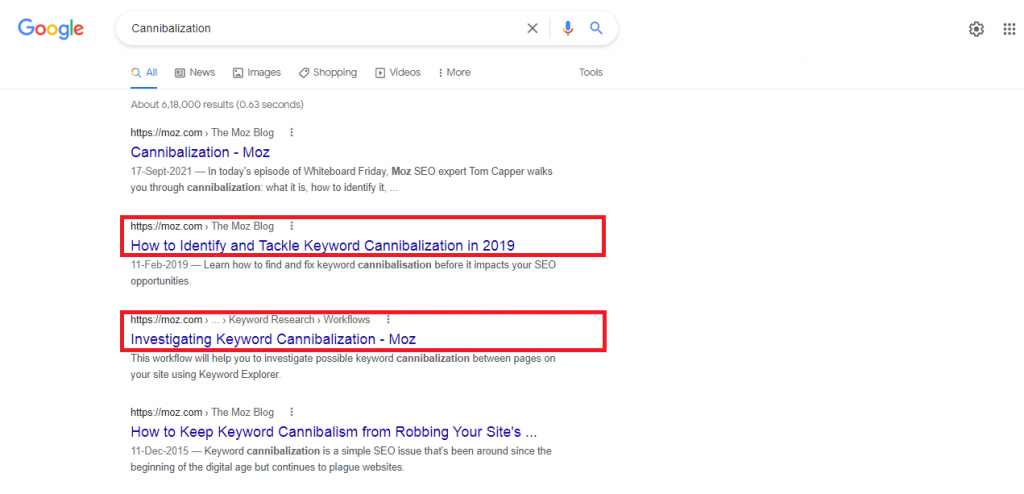
The images precisely depicts that Google is able to make a difference between the content and show most of the time the most relevant results.
That is how you come across two pages from the same domain for the same keyword these days.
This validates the point stated earlier, with each algorithm and core update roll-out Google gets more sophisticated.
And now it can understand the content that is on each page, the images that are used to describe it, the context, the user’s localization, and so on.
I’m saying this to urge you to double check if your rankings get affected or not before you start your process to fix keyword cannibalization.
Meanwhile, you should also bear in mind that it lowers your chances to attract a wider audience as you are clining on what you already have.
And, getting back to the image above,
On seeing those two pieces of content that are different but relating to the same keyword/topic, don’t you find it odd to fix keyword cannibalization when it can be of a good support a better strategy?
Keyword Cannibalization is an opportunity
Of course! Two different pages ranking for the same keyword should be seen as more of a good SEO strategy rather than being questioned anymore.
As there aren’t any guidelines that would say what you shouldn’t do, this leads to many misinterpretations.
When Google is mature enough to see it as an advantage for attracting new audiences, why should we prevent it?
So, I stand by Patrick Stox’s explanation, No need to fix keyword cannibalization issues, it is more of an opportunity nowadays.
And Patrick said this based on the concept explained below.
When you have two strong pages that can bring different values for the same keyword, then in this case you won’t have to doubt keyword cannibalization as it can be a great SEO opportunity.
Are you wondering how?
It Can Increase Your CTR:
More space is taken through each ranking position for the pages featured in SERP from the same domain.
It will Improve Your Search Visibility:
More keywords with higher positions leads to growing your overall search visibility for your website.
More Traffic Due to More Results:
Every piece of content is written targeting a specific type of audience and if we start with the strategy of two pages that rank for the same keyword could double our traffic.
What is Keyword Cannibalization in SEO?
Pac-Man is an action maze chase video game; the player controls the eponymous character’s journey within an enclosed maze.
The objective of the game is to eat all of the dots placed within the maze the main goal is to avoid four colored ghosts — Blinky (red), Pinky (pink), Inky (cyan), and Clyde (orange).
Compare and Contrast
Let’s assume that the Pac-Man is you, and the dots spread within the maze are your competitors.
PacMan → You
Dot → Competitors
Maze → Your Niche
Ghosts → SEO Myths
And, when PacMan eats all of the dots, you advance to the next level. As per the rule, if Pac-Man is caught by a ghost, he will lose a life and the game ends.
Each of the four ghosts has its unique artificial intelligence (A.I.). Blinky, Pinky, Inky, and Clyde are programmed to chase and corner Pac-Man and flee from him.
Similarly, Lets compare PacMan with your SEO game. By overthrowing all your competitors you get to dominate your niche.
So, you need better tactics and a clear plan to eat-up your competitors organice progress and advance to the next level in the SEO game.
And, in this process being unware and getting caught among the SEO Myths such as keyword cannibalization in SEO will stop you from reaching your goal.
Asides from these, let’s try to be honest! Despite the fear of getting caught, haven’t you ever felt that these three ghosts aren’t cornering you but fueling the fire in you towards your target?
Exactly the same way, Google’s algorithm roll-outs have given a brand new perception to fix Keyword cannibalization. It’s no more a myth. So, start seeing it as an opportunity to outwit your competititor.
Misconceptions of SEO Keyword Cannibalization
I’m familiar with queries on having multiple pages targeting the same term.
Many are worried that this would somehow confuse search engines.
This whole idea is ridiculous. Search engines are clever enough to know what is on individual web pages.
People assume that a search engine can’t be right always and Google may show the wrong page for a search term in search results, but that’s not right, either.
There is something you need to know before you start to fix keyword cannibalization.
What you find the best page for a term may differ from what the search engines consider the most relevant page for that same term.
The intent is the key here. If your page doesn’t have relevant information or is surrounded by informational “how to” articles or pages from Wikipedia, aided by Wikipedia page creation service, there is a high chance that your pages aren’t going to show.
We know pages rank for more than one keyword, and a quick look in Google Search Console’s search analytics report will expose the different terms your page ranks for.
From the following image let’s say page A ranks for 100 different keywords, and page B ranks for 60 different keywords.
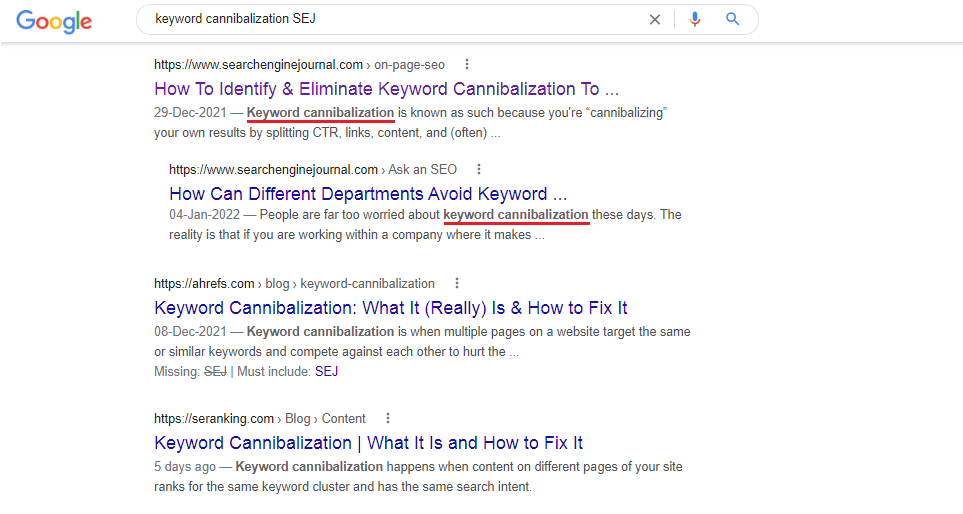
Can you figure out how much overlap there may be?
Regardless of the shared keywords, the content on the page and the intent behind both are very different.
They will mostly show for other terms, or both of them may show for the same term, but in either cases there is no harm done.
On the other hand, If these two pieces of content seems to be ranking for that same query with the same intent.
Yes! Both pages will have been indexed, but you’re diluting the value of the content that you’re providing across multiple pages.
And, this means they are, in essence, competing against each other. So, this drags the strength of these individual pages when it comes to competing against other your competitor’s websites.
This is exactly what you have to be aware of.
When you have two pages, and they’re both targeting the same keyword, make sure that they both have completely different intents. If so, then this seems kind of reasonable.
As it’s common to have users who would search for that keyword with different intent.
In such cases, both pages become essentially unique pages. And this is the reason why both of them got ranked in Google’s SERP.
How to find Cannibalized keywords in SEO?
The trick to identifying keyword cannibalization issues is to find pages that target the same keywords and meet the same or very similar intent.
When the intent is the same, each page is unlikely to be ranking for lots of different long-tail keyword variations.
So there’s usually more to gain than lose by exploring the page’s content.
Let’s look at a few simple ways to identify these pages. This isn’t a big deal. Identifying Cannibalization can be done perfectly if you know how to do it.
Use Your Website Search widget
Search for keywords that you doubt may be competing. As a result, you might find that multiple URLs will appear for one keyword search
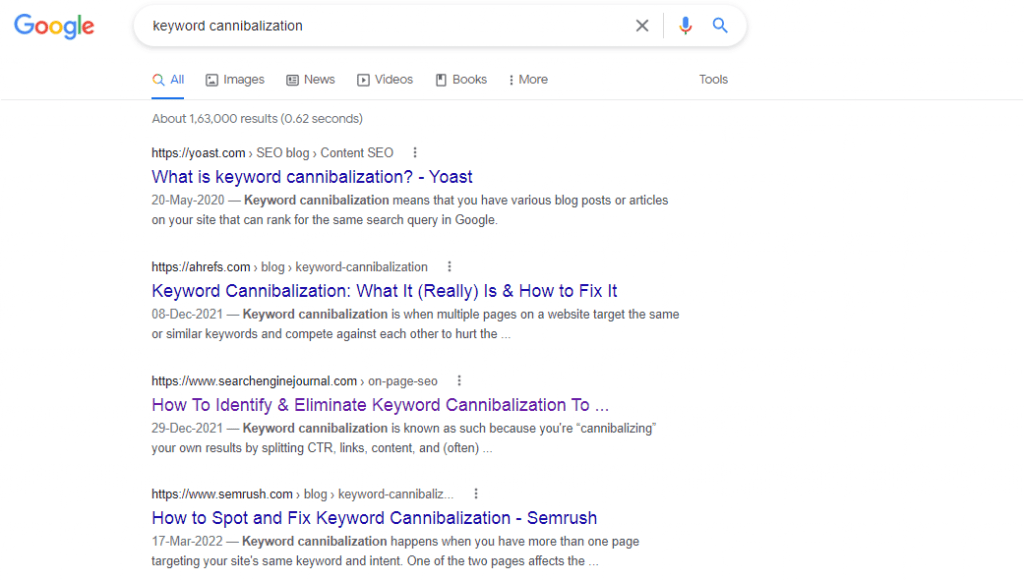
Expert Suggestion:
Always, before you live a new page on your website, consider searching for the main keyword in the search widget to see if it appears elsewhere and make a note of it.
Employ ‘Site:’ Command
Never ignore the basic features of Google, there are useful commands that let you analyze a website.
With the site command, you can detect your indexed pages and if you add to that search term or key phrase in quotes, you can see all the content within that domain:
site: yourwebsite.com + “keyword”
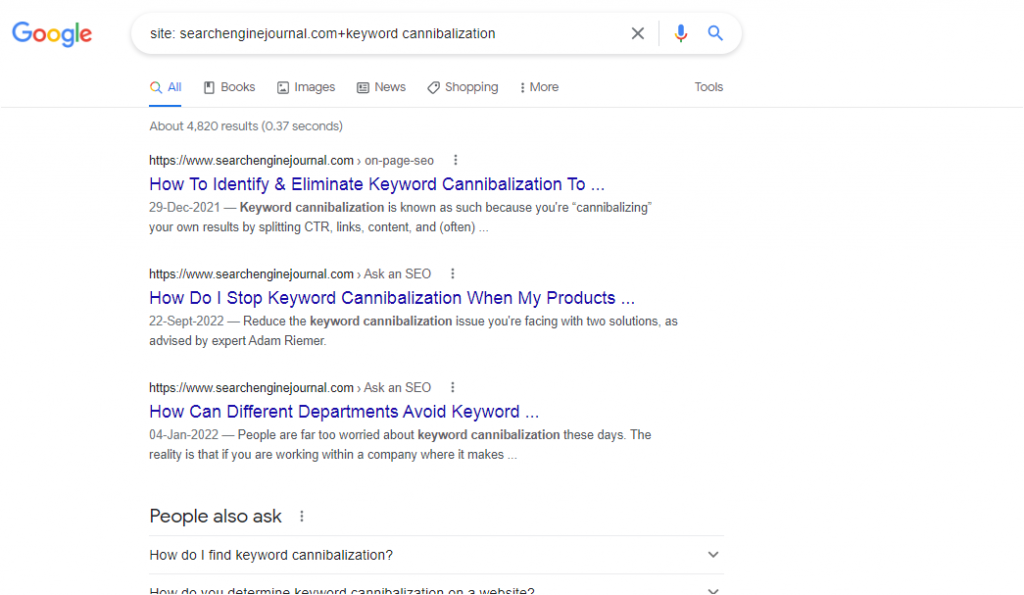
The SERP appears with all the URLs of your mentioned domain that are indexed and has in the quoted keyword in common.
Now it’s under your own surveillance, you can now carefully scrutinize if these pages have content that could meet the user’s needs.
Using Google Search Console
To make use of the Google Search Console to identify keyword cannibalization your website must be registered on Google Search Console.
Quick Three Step Search:
Using your registered account login into Google Analytics and in the “Search Traffic” section.
Click on the “Search Analytics”.
A list of Keywords will get displayed below the graph. And, among the list of keywords that are shown, select the one you doubt in terms of cannibalization.
Then you must activate the “Pages” option. By doing this you will know which URLs that specific keyword is ranking for.
If you find keyword positioning for two or more different pages of your website, obviously you have keyword cannibalization.
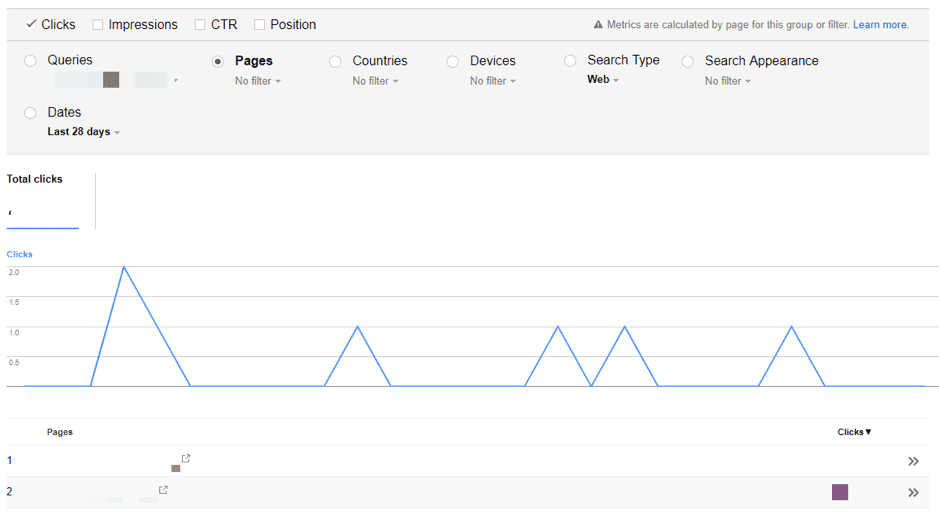
Expert Suggestion:
Another simple yet efficient method is to claim access to a reliable keyword cannibalization checker like Serpple. This highly advanced keyword rank tracker tool instantly notifies you if it identifies the cannibalization of your keywords, Give it a try.
Possessing the wisdom to know the difference between treating cannibalization in SEO as a threat or opportunity is more important than knowing about cannibalization, spotting it, or even rectifying it.
In Closing
Keyword cannibalization started to be the antagonist in the content and SEO world only after web spammers used it defectively to increase rankings for lots of pages with the same content on the same keyword.
In my guess, they must have done it to escape from link-building.
Do you deny it?
If yes, why?
Content and links go hand in hand. This is a universal SEO truth (Google lists them among the top 3 ranking factors).
And do you think spammers wouldn’t have discovered it in the early days?
They may have! Asides from all, the good part is Google’s algorithm updates have affirmed that it isn’t required o fix keyword cannibalization in all cases.
If handled with caution keyword cannibalization is like the Joker, Yes! The well-known villain who doesn’t intend to kill the hero.
It can be an opportunity for strong pages. In the long run, coming up with the best keyword strategy and a well-planned content map for your websites could help you overcome similar situations.
All of the myths discussed above are for you to take into consideration. Being the decision maker is the most delicate part of an SEO journey.
Always think twice before you decide and look for an opportunity in everything that’s being branded as a threat. May your decision skyrocket your rankings!
And, if you bet to differ from my perspective let me know via mail to [email protected].
Have you ever had a whole different SEO experience regarding the same that’s worth sharing so that your fellow mates get aware of it? Then join our Facebook Community.
Published by
Adam White
Adam White is a 20+ year SEO professional who has optimized over 400 websites, built and sold over 20 internet and SaaS businesses all with SEO as the main traffic source. Follow him on Twitter/X
All stories by Adam White
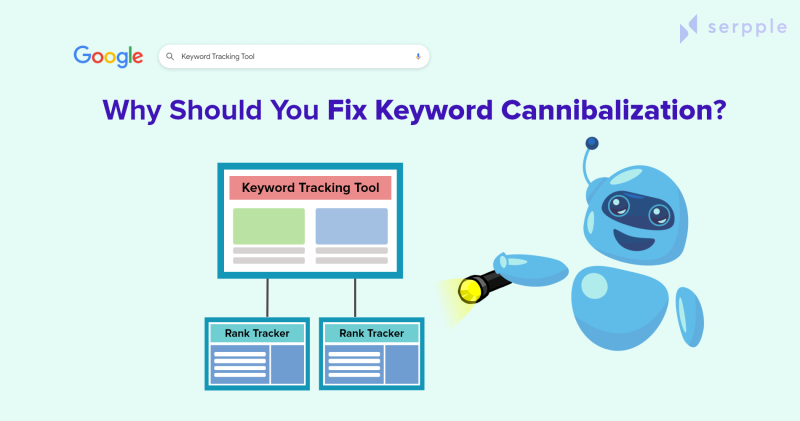



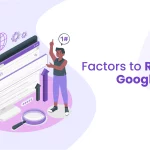
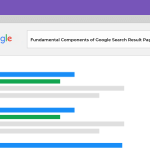
Pingback: Keyword Mapping: Learn How To Do It in Five Steps - Serpple